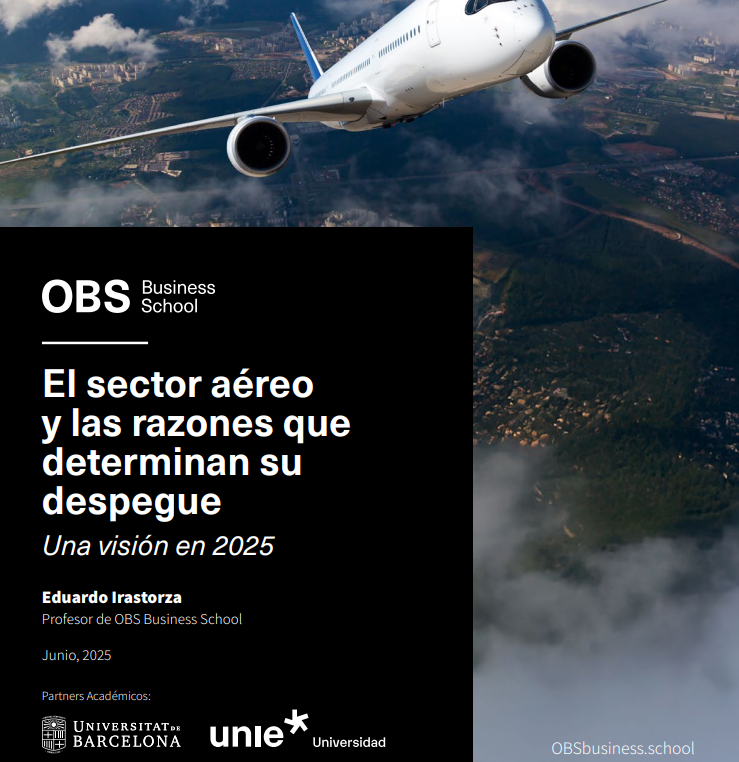
OBS Report: The Aviation Sector at Risk from Emerging Powers
The absence of a unified European policy endangers the aviation sector amid the rise of emerging powers

- The time has come to consider flights within Europe as domestic; this is the only way to compete globally in the future.
- Leading the direct and personalized relationship with the customer—without handing it over to suppliers—is vital for airlines; Big Data and CRM tools are essential for building a strong relationship that can later translate into profitability.
- The activation of a Legal Committee is necessary to ensure consistent criteria and unified legislation regarding the handling of travelers' private information.
- The energy transition is making progress in the sector, but at a slower pace than expected.
June 2025. OBS Business School, an institution that is part of the Planeta Formación y Universidades higher education network, publishes the report The Aviation Sector: A Vision for 2025, directed by Professor Eduardo Irastorza. The airline industry has already returned to profitability, with new emerging powers successfully joining the market, and business models beginning to leverage new technologies and energy regulations.
In Europe, despite having returned to a path of growth, the sector is still uncertain about its direction and the regulations it wants to follow in the near future. Particular and national interests continue to prevail over the essential, urgent, and decisive need for joint action. It is imperative to ask ourselves whether, under these conditions, we can truly speak of competitiveness when compared to countries like China and India, with their three billion inhabitants. The author comments:
"There are survival reasons for Europeans to resolve their differences and pool talent and resources to consolidate a credible competitor in the 21st century"
The Asian giants, China and India, along with emerging economies such as Indonesia, the Philippines, and Vietnam, are following a three-phase progression model. In the first phase, they create low-cost airlines using older aircraft models acquired from the West. In the second phase, they improve the quality of their aircraft and the range of their flights, beginning to shift toward a value-oriented offering (this is the stage where most currently find themselves). In the third phase, their aviation sectors are expected to be sustained by strong domestic markets, with the goal of developing their own aircraft manufacturing industries—eventually competing even with high-value offerings thanks to their economies of scale.
The Airlines That Fly the Most
The airlines that currently operate the most flights are still predominantly Western. Of the top five, four are American: American Airlines, Delta, United Airlines, and Southwest Airlines. The only exception is Ryanair, which far surpasses other European carriers such as Lufthansa, IAG, or Turkish Airways.
In 2023, this airline brought no fewer than 49 million passengers to Spain from all corners of the continent.
The Future of the Aviation Sector
The aviation sector faces a complex yet exciting future: the energy sources used will become cleaner and will gradually replace fossil fuels—albeit much more slowly than expected. It will be a gradual process that has already begun to make an impact in the West.
This future also demands the development of comprehensive strategies—namely, taking the lead in managing a direct and personalized relationship with the customer, without handing it over to suppliers. Efficiently managing Big Data and CRM tools will be key to maintaining a strong and profitable relationship. As Irastorza explains:
"The model with the most promising future is the one that places the customer at the center, with a strong and seamless relationship manager, surrounded by various providers"
Opportunities are also emerging through cross-sector alliances, bringing together airlines, hotel chains, restaurants, and car rental companies. The goal is clear: to offer complementary services and compete on a large scale.
The battle is also on the ground
An excellent in-flight experience is no longer enough for an airline to be chosen by travelers. Thanks to new digital technologies, the “Intelligence Departments” of companies in the sector are now closer than ever to building long-lasting, quantitatively and qualitatively profitable relationships with their customers.
One of the ways to achieve this is through the analysis of digital footprints on social media and the internet, which raises significant ethical and legal challenges. Kim Macaulay, Chief Data Officer at IATA, warns that the diversity of regulations and legal definitions regarding privacy makes compliance even more difficult for airlines.
The report recommends the creation of a Legal Committee to unify criteria and ensure clear legislation on the handling of personal information.
Spain rising to the challenge
Spain, for its part, has efficient airlines that cover all market segments, but it still needs to strengthen its domestic transportation. The upcoming European legislation aimed at restricting this type of flight does not make the process any easier.
"The time has come to consider flights within Europe as domestic; this is the only way to compete globally in the future," OBS report.
Content written by:
Carmen García-Trevijano
OBS Business School's Press Office



